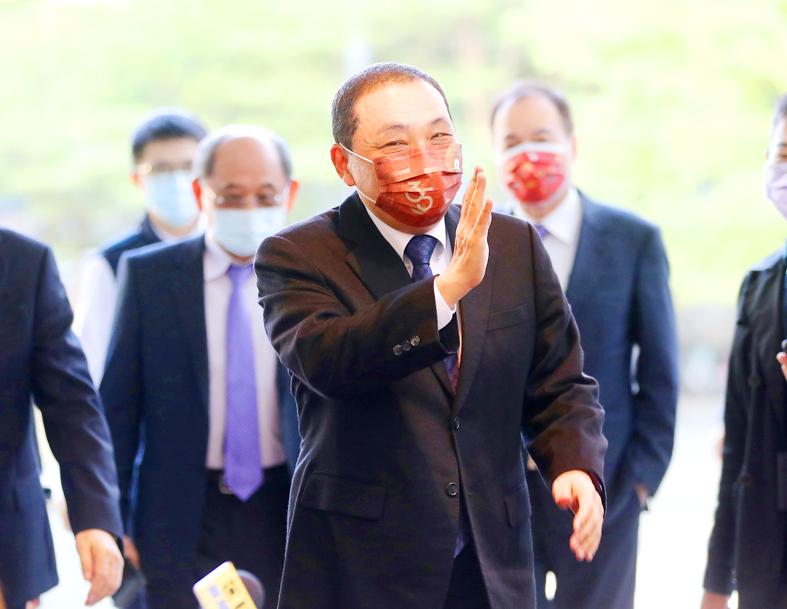New Taipei City Mayor Hou You-yi (侯友宜) has triggered speculation over his stance on Saturday’s referendums after writing on social media that voters should exercise their independent judgement.
On the ballot are to be questions related to banning the importation of pork containing traces of the leanness-enhancing feed additive ractopamine, relocating a natural gas terminal project to protect algal reefs off Taoyuan’s Guanyin District (觀音), restarting construction of the Fourth Nuclear Power Plant in New Taipei City’s Gongliao District (貢寮) and holding referendums alongside elections.
Writing on Facebook on Monday evening, Hou, a member of the Chinese Nationalist Party (KMT), called on the public to make up their own minds on the referendums, saying that no one has the right to tell someone else how to vote.

Photo: CNA
“The referendums should be held after the public has calmly debated the issues with the help of experts, reason and science... Instead, they are treated as a straight-ticket vote and voters are being spoon-fed choices,” he wrote.
“The reason for holding a referendum is to make known the people’s will, and for them to weigh the pros and cons of each proposition in their own mind before arriving at a decision,” he said.
The nation cannot afford divisions and internal strife, Hou said.
His unchanging political belief is to “put the people’s welfare above all else, including the party, factions and my personal ambitions,” he wrote.
Hou told a news conference at the Shulin Civil Sports Center yesterday that the post “conveys the core belief that the people should decide after debating the issues with reason, science and logic.”
Asked to comment on Hou’s post, KMT Chairman Eric Chu (朱立倫) told a news conference at the party’s headquarters in Taipei that the KMT “has a duty to courageously state its position regarding the issues.”
Hou has a right to express his opinion to the party’s supporters, but politicians need to exercise the art of speaking carefully in a multi-party democracy, KMT caucus convener Alex Fai (費鴻泰) said.
“Of course, the party hopes that Hou would clearly communicate his stance. New Taipei City voters are an important part of the party’s base and a majority of the public supports the four referendums,” KMT Legislator Lai Shyh-bao (賴士葆) said.
Later yesterday, Taoyuan Mayor Cheng Wen-tsan (鄭文燦), of the Democratic Progressive Party, told a news conference at city hall that Hou’s post shows that he opposes the KMT’s position on the referendums.
Numerous county commissioners and mayors have demurred from the KMT’s line of voting yes on all four referendums and Hou is expressing his dissent in a polite way, Cheng said.
The four referendums reflect the political extremism that hijacked the KMT under then-chairman Johnny Chiang (江啟臣), Cheng added.

NATIONAL SECURITY THREAT: An official said that Guan Guan’s comments had gone beyond the threshold of free speech, as she advocated for the destruction of the ROC China-born media influencer Guan Guan’s (關關) residency permit has been revoked for repeatedly posting pro-China content that threatens national security, the National Immigration Agency said yesterday. Guan Guan has said many controversial things in her videos posted to Douyin (抖音), including “the red flag will soon be painted all over Taiwan” and “Taiwan is an inseparable part of China,” while expressing hope for expedited “reunification.” The agency received multiple reports alleging that Guan Guan had advocated for armed reunification last year. After investigating, the agency last month issued a notice requiring her to appear and account for her actions. Guan Guan appeared as required,

A Vietnamese migrant worker yesterday won NT$12 million (US$379,627) on a Lunar New Year scratch card in Kaohsiung as part of Taiwan Lottery Co’s (台灣彩券) “NT$12 Million Grand Fortune” (1200萬大吉利) game. The man was the first top-prize winner of the new game launched on Jan. 6 to mark the Lunar New Year. Three Vietnamese migrant workers visited a Taiwan Lottery shop on Xinyue Street in Kaohsiung’s Gangshan District (崗山), a store representative said. The player bought multiple tickets and, after winning nothing, held the final lottery ticket in one hand and rubbed the store’s statue of the Maitreya Buddha’s belly with the other,

‘NATO-PLUS’: ‘Our strategic partners in the Indo-Pacific are facing increasing aggression by the Chinese Communist Party,’ US Representative Rob Wittman said The US House of Representatives on Monday released its version of the Consolidated Appropriations Act, which includes US$1.15 billion to support security cooperation with Taiwan. The omnibus act, covering US$1.2 trillion of spending, allocates US$1 billion for the Taiwan Security Cooperation Initiative, as well as US$150 million for the replacement of defense articles and reimbursement of defense services provided to Taiwan. The fund allocations were based on the US National Defense Authorization Act for fiscal 2026 that was passed by the US Congress last month and authorized up to US$1 billion to the US Defense Security Cooperation Agency in support of the

CLASSIFIED BRIEFING: The ministry said the special budget focuses on building a comprehensive defense system and strengthening the domestic defense industry The Ministry of National Defense yesterday released information on seven categories of weapons systems to be procured under a stalled NT$1.25 trillion (US$39.57 billion) special defense budget, including precision artillery, long-range missiles, air defense anti-tank missiles and more than 200,000 uncrewed aerial vehicles (UAVs). The Executive Yuan approved a draft version of the budget on Nov. 27 last year and submitted it to the legislature for review. The legislature’s Foreign Affairs and National Defense Committee yesterday invited Minister of National Defense Wellington Koo (顧立雄) to deliver a classified briefing and answer questions at a closed-door session. Koo said he hoped to provide lawmakers